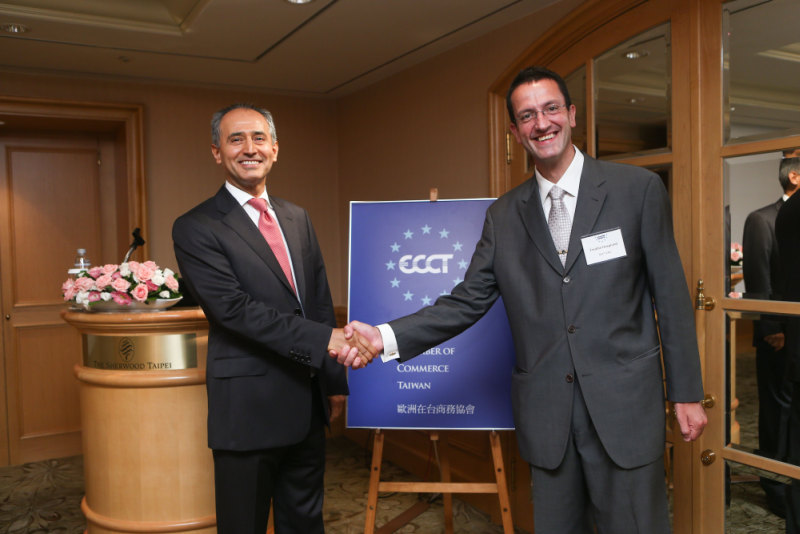Industry 4.0: A vision on the way to reality

On 3 September, the ECCT hosted a Special Lunch with guest speaker Erdal Elver, President and Chief Executive Officer of Siemens Limited Taiwan on the subject "Industry 4.0: A vision on the way to reality".
The manufacturing portion of GDP in developed as well as developing countries continues to shrink in favour of the services sector. As a consequence, there has been a drive in many developed countries to refocus on manufacturing.
In the 1970's, manufacturing generated about 35% of GDP in Germany and about 25% in the United States. By 2010 this had fallen to about 19% in Germany and 20% in the United States. However, manufacturing still accounts for about 70% of Germany's exports and 77% of its R&D spending. Meanwhile on average, one job in manufacturing creates two jobs in other segments. Therefore, the importance of manufacturing is much larger than the raw numbers suggest. The added benefit is that manufacturing is seen as a guarantee for growth, employment (because it provides well-paid jobs) and prosperity. It is therefore a stabilizing social factor.
The term "Industry 4.0" refers to what some believe is the next industrial revolution. In practice, it is a forward-looking project initiated by the German federal government to re-vitalize its local manufacturing sector. The EU's the aim is to increase manufacturing to at least 20% of GDP by 2020 and Germany is aiming for an even higher percentage. The key objective is to strengthen Germany's competitive edge by increasing manufacturing efficiency, shortening time to market and increasing the flexibility and variety to best respond to local and international demand. The "Industry 4.0" Working Group was set up in January 2011 with participants from industry (including Siemens), academic institutions and other associations supported by the German Ministry of Education and Research. Its purpose was to formulate comprehensive strategic recommendations for implementing "Industry 4.0" on the industrial areas of production and manufacturing.
Manufacturing is changing faster than ever before. In terms of efficiency, energy and resource efficiency are now decisive competitive factors. In terms of time to market, there are now much shorter innovation cycles, more complex products and larger data volumes. Finally, the ability to be flexible to deal with individualized mass production and volatile markets is necessary for survival.
The development towards 4.0 will lead to completely digitalized manufacturing and smart factories. These smart or digital factories will have self- organizing and optimization capabilities, which will allow greater flexibility, efficiency and productivity, 30% or more, than factories today. Smart factories will be the benchmark in future manufacturing economies and a decisive competitive advantage.
There are 10 promising technologies that will be deployed in Industry 4.0: mobile internet, knowledge automation, the internet of things, cloud computing, automotive technologies, robotics, energy storage, 3D printing, advanced materials and renewable energy.
In the manufacturing industry of the future, product development, production and services will communicate through software and networks, machines and products will exchange information and instructions in real time and there will be autonomous control and optimization. In the factories of the future, machines and products on the production line will be programmed to control themselves during the production process without the need for constant human intervention. This will speed up the entire process, identify errors and correct them in real time.
The old way of moving from conception to design to prototype will be transformed with a fusion of the virtual and real world and the integration of product design and production engineering. Cyber-physical systems will maintain and update all product information (software, mechanical etc.) as digital models which will be kept constantly up to date over the product's entire life cycle. Digital simulations will replace many of the steps in traditional production processes. This will speed up the process and reduce the time to market. In so doing, it would also significantly reduce the need for physical materials and energy, thereby reducing the impact on the environment and making industry greener and more sustainable.
While many aspects of the Industry 4.0 concept are already being implemented by companies like Siemens, there is a still some way to go to realize the 4.0 vision. Notably, product to product and machine to machine communication needs to be made more sophisticated, there needs to be a more seamless integration of virtual and real processes and people will need to be trained for the new production process. While people will no longer be needed for most manual tasks, people will be crucial in the creative sphere of product and production design and at the operational level as creative planners, controllers and monitors.
